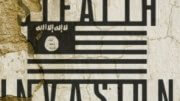Article 8 in a series (see full lnterfaith list here)
 This article covers a topic that most of us have some familiarity with—jihad. There is much misinformation about this topic, so we are going to focus on only a few significant items.
This article covers a topic that most of us have some familiarity with—jihad. There is much misinformation about this topic, so we are going to focus on only a few significant items.
What Does Jihad Mean?
The first item is what exactly does jihad mean. According to Pete Seda, “the word jihad literally means struggle.”[1] This is true, but what really matters is what does this word mean within the context of the Qur’an? What kind of struggle? Below are just a few verses from it and Ibn Ishaq’s sirat.[2]
Then, when the sacred months have passed, slay the idolaters [non-believers] wherever ye find them, and take them (captive), and besiege them, and prepare for them each ambush. But if they repent and establish worship and pay the poor-due, then leave their way free. Lo! Allah is Forgiving, Merciful. (S9.5)[3]
Fight in the way of Allah, and know that Allah is Hearer, Knower. (S2.244)
As for those who disbelieve I shall chastise them with a heavy chastisement in the world and the Hereafter; and they will have no helpers. (S 3.56)
We shall cast terror into the hearts of those who disbelieve because they ascribe unto Allah partners, for which no warrant hath been revealed. Their habitation is the Fire, and hapless the abode of the wrong-doers. (S3.151)
The only reward of those who make war upon Allah and His messenger and strive after corruption in the land will be that they will be killed or crucified, or have their hands and feet on alternate sides cut off, or will be expelled out of the land. Such will be their degradation in the world, and in the Hereafter theirs will be an awful doom. (S5.033)
God said, ‘It is not for any prophet (before thee) to take prisoners from his enemies until he has made slaughter in the earth.’ … God desires the next world, i.e., their killing them to manifest the religion which He wishes to manifest and by which the next world may be attained.[4] (484)
Fight everyone in the way of God and kill those who disbelieve in God. (992)
In the passages from the sirat, the word God refers to Allah. None of the verses above have anything to do with a personal struggle, nor do most of the other verses about this topic within the Qur’an. None of the verses above are constrained to a particular time or place either. They are open ended, to be carried out until the task of all submitting to Islam is complete.
Are There Different Kinds of Jihad?
Most people do not realize that there are different forms of jihad. In addition to jihad of the sword, with which we are most familiar; there are several non-violent types including jihad of the mind (teaching), pen(writing), tongue (speaking), piety (charitable acts), and wealth. All who follow Islam are required to advance it, by peaceful means if possible or violent means if not. Examples of the non-violent forms includes the publication of books and articles favorable to Islam (such as the Islam Is … book we’ve been citing), the creation of Middle Eastern studies chairs at colleges and universities, the establishment of organizations supporting Islam such as the Council on American Islamic Relations (CAIR), and the funding of mosques and the other items just mentioned by Saudi and other monies.
This is the fulfillment of the Muslim Brotherhood’s civilization jihad described in their Explanatory Memorandum[5] incorporated into the Holy Land Foundation trial.
What Does Peace Mean?
We discussed in preceding articles several instances where the same word means something different in Eastern and Western cultures. Another such word is peace. In West the idea of peace is characterized by the following quote from Augustin: “Peace is the end sought for by war. For every man seeks peace by waging war, but no man seeks war by making peace.”[6] He goes on to say even they who intentionally interrupt the peace do not hate peace, but only want a peace that suits them better.
This notion assumes that peace is man’s normal state. Peace happens when a people is turned toward God as they obey divine law: to love God and our fellow man. One’s actions should generally be charitable as their focus should be on self-sacrifice. When man turns away from God and toward himself, he is more likely to harm others by his actions. He turns from self-sacrifice to self-interest: “For he sees that peace cannot be maintained unless all the members of the same domestic circle be subject to one head, such as he himself is in his own house.”[7] Man turns from virtue to vice in order to enforce his will on others.
A Different View of Peace
The Arabian Peninsula’s environment was very different in some respects. It was harsh and unforgiving. Life was often lived on the edge as there frequently was not enough for everyone. Raiding was a centuries old means of obtaining what you needed but did not have. Alliances were struck where beneficial, but subject to change as needs changed. Things could and did change rapidly.
Into the sixth century, unlike the rest of the known world, Arabia had no rule through a central authority. Instead tribal rule was exercised, and a leader was responsible for those in his clan or tribe. A code of conduct called muruwa existed, and represented the Arabic idea of manliness and honor. This honor was maintained or increased based upon the results of one’s actions, whether those actions brought prestige or increased a tribe’s wealth. The outcome is what mattered. Killing another was okay if it was seen as bettering a tribe’s position or done in retaliation for a dishonorable act.
In such an environment, conflict was the norm, and peace the interlude between conflict. This notion fits with the kind of submission required by Islam. Peace is obtained only after the struggle ceases, when there is submission. I am not saying than one culture is better than the other, or that one is right and the other wrong, but merely that in some ways the cultures were very different and in this respect the opposite of each other. This Arabic culture was incorporated into Islam. This is seen by the integration of Islam’s teachings into the Arab Sunna that existed before Muhammad,[8] in addition to other cultural carry overs such as polygamy, slavery, and child weddings.
Islamic Jihad Falsehoods
This section will present some additional statements from Islam Is … about jihad, and present some facts that cannot be explained away when considering Islam’s history. Some of the quotes come from the Qur’an and are indicated by an ‘S’ followed by a number.
Fight When Attacked
The Qur’an makes it clear that it is permissible for people to fight back against those who attack them. God says, “Fight in the cause of God those who fight you, but do not transgress limits; for God loves not transgressors.” (S 2.190)
It is permissible to attack another only when you are attacked. When Muhammad died in 632, he had placed almost all of the Arabian Peninsula under his control. Yet, within 100 years time Islam had expanded its territory from the Arabian Peninsula to southern France in the West and modern India in the East. This area is as much as Rome commanded at the height of its power, but it took Rome almost five centuries to acquire. Islam in the West was only turned back at the Battle of Tours under Charles ‘The Hammer’ Martel in 732. It was the non-Islamic kingdoms who fought a defensive war against Islamic aggression, and it was in response to Islamic aggression and its treatment of non-Muslims that resulted in the Crusades. (Click here for more about Islam’s early history.)
Fight Against Oppression and Repression
It is permissible to fight against oppression and persecution. This does not apply only to Islam and Muslims, because everyone has the right to worship God. “To those against whom war is made, permission is given [to fight] because they are wronged and verily God is Most Powerful for their aid.”[9] (S22.39)
This statement indicates that one is permitted to fight when they are not allowed to worship God. However, within Islam only its form of worship is recognized as worshipping God. Early Islamic rule was in many ways no different from the surrounding kingdoms it encountered. What is unusual is the extent to which Islamic rule carried out those principles, and the length of time over which they were executed. Islam found and incorporated much of its law and governance structures from the Byzantines and Persians. Under the Abbasid Dynasty, the Islamic governance structures hardened into what we know today. (Click here to read the first of three articles about the Abbasid Dynasty).
Defend Others of Faith
To those against whom war is made, permission is given [to fight] because they are wronged and verily God is Most powerful for their aid. [They are] those who have been expelled from their homes in defiance of right [for no cause] except that they say, ‘Our Lord is God.’ If God did not check one set of people by means of another, there would surely have been pulled down monasteries, churches, synagogues, and mosques, in which the name of God is commemorated in abundant measure. [S 22.39-40] This clearly means that Muslims must fight to protect and defend people of other faiths if they are in areas where the Muslims have effective power. The life, honor, and property of all people are considered sacred whether they are Muslim or not.[10]
This is a startling claim as dhimmitude was formalized under the Abbasid. Dhimmis are the non-Islamic peoples living in land under Islamic control. Those not following Islam were the property of the state (fay). They had almost no rights. They were only allowed to stay at the pleasure of the Islamic governing authorities, were required to pay extremely harsh taxes, and were reduced to slave labor cultivating the land. Passports were first created during this era, and were required for the non-Islamic population to leave their area. Tattoos were used to identify the kingdom and city to which a dhimmi belonged. Dhimmis were to be humiliated during the payment of their taxes. While there were writings limiting this practice, history shows they were very seldom carried out. (Click here for more information on dhimmitude)
No Such Thing as Holy War
There is no such thing as “holy war” in Islam or in the Qur’an.[11]
In the overwhelming number of instances where the word is used within the Qur’an, jihad is referring to war. In addition, Muhammad created the Constitution of Medina soon after leaving Mecca. This is one of his first acts after arriving at Medina. Part of this document says the following. It is interesting to note that Islam does not start its calendar from when Muhammad received his first revelation in 610, but instead when he migrated to Medina in 622, shortly before this document was created.
The Jews shall contribute to the cost of war so long as they are fighting alongside the believers. The Jews of the B. ‘Auf are one community with the believers (the Jews have their religion and the Muslims have theirs) … The contracting parties are bound to help one another against any attack on Yathrib. If they are called to make peace and maintain it they must do so; and if they make a similar demand on the Muslims it must be carried out except in the case of holy war.[12] (344)
The Truth About Jihad
Like it or not, believe it or not, we are in a war. We did not ask for it, nor did we start it. It is a war that has been declared upon us simply because of what we believe. It has been going on for almost 1,400 years. All wars have casualties. No one knows exactly how many have died in this one, but a few have attempted to estimate the number using both Islamic and non-Islamic source documents. These estimates put the numbers in the hundreds of millions. One source puts the estimate at about 270 million, or about 200,000/year.[13] These figures include Christians from all sects, Jews, Zoroastrians, Buddhists, Hindus, Llamaists, Gnostics, and pagans. In short, anyone who did not follow Islam. In the last decade alone it is estimated that 900,000 Christians have died. The figures for their deaths by Islam are 30,000 in 2016 and 115,00 in 2015 – and these numbers represent only the Christians who have died.
This is the harsh reality, and it only temporarily subsided after the Ottoman Empire’s defeat at the end of World War I. We are free to make our own choices, but we should at least be honest using facts in our discussions and analysis.
Dan Wolf is a researcher, analyst, and author. He has written three books examining the relationship between faith, freedom, virtue, and charity. Together these form the cornerstone of our purpose, and our society’s foundational principles derived from those relationships. Links to his work can be found at the Living Rightly website.
[1] Seda, Pete, Islam Is …, p. 13, 2002.
[2] Biography of Muhammad’s life.
[3] All Qur’an verses are from Pickthall, M. M., The Meaning of the Glorious Qur’an, amana publishing, 1999.
[4] Guillaume, A., The Life of Muhammad: A Translation of Ibn Ishaq’s Sirat Rasul Allah, pp. 326-7 and p. 672, Oxford University Press, 2006. The reference is to the paragraph number appearing alongside the text.
[5] An Explanatory Memorandum: On the General Strategic Goal for the Group In North America, 5/22/1991, p. 4, http://www.clarionproject.org/Muslim_Brotherhood_Expanatory_Memorandum, accessed 11/2016.
[6] Schaff, Philip, Nicene and Post-Nicene Fathers, Vol. 2, Augustin: City of God, Christian Doctrine, p. 407, Wm. B. Eerdmans Publishing Company, Book XIX, Chapter XII.
[7] Ibid, p. 408.
[8] Goldziher, Ignaz, Introduction to Islamic Theology and Law, p. 231, Princeton University Press, 1981.
[9] Seda, Pete, Islam Is …, p. 13, 2002.
[10] Ibid.
[11] Ibid.
[12] Guillaume, A., The Life of Muhammad: A Translation of Ibn Ishaq’s Sirat Rasul Allah, Oxford University Press, 2006.
[13] There are several sites which contain additional information on this topic. One is Bill Warner’s Political Islam site at https://www.politicalislam.com/tears-of-jihad/. Accessed November, 2016.





